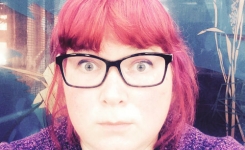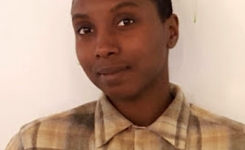Dublin is a city undergoing a building project. It was impossible to miss the signs of the progress of this transformation as I travelled towards the chq Building on the docks for AlterConf.
The conference left me with much the same feeling about the tech industry: it had a theme of development, improvement, and hope best summed up by February Keeney’s wonderful call to build beautiful communities.
The event opened with remarks from creator, organiser, and host Ashe Dryden (@ashedryden), including the perennially good advice that doing what you need to to look after yourself isn’t rude. Then we were off into the main programme, beginning with:
Jacqueline Russell – We Want to Believe, But We Don’t
@canuckjacq challenged us to think about why the tech industry is failing at building up its diversity, explaining that it’s because we do not truly believe that diverse teams make better products – though they do!
Jacqueline made clear that marginalisation is not an issue limited to the tech industry, but it is magnified within it as tech jobs are lucrative and desirable. This means that improving the tech industry can have a wider societal impact. Yet we are still taught not to trust the potential of marginalised people, and may not expect them to do well for unfair reasons such as how they look and whether they have been able to get a degree or unpaid internship. But removing ones own biases and choosing people for opportunities regardless of identity, and then supporting the chosen individuals, will lead to change.
Change is hard work, Jacqueline conceded. It would be easier to leave things as they are. But building better diversity and inclusivity is necessary just as building better hardware and programming languages is. So let’s act like we believe.
Jenny Wong – Building an Accessible Community
@miss_jwo then talked about organising WordCamp London and the many ways an event such as this can be built from the ground up to be as accessible, and therefore inclusive, as possible.
There were far more ideas put forward than I can cover here, ranging from the free and easy to the expensive and complex. They included:
- Using gender neutral pronouns in event communications.
- Good space planning, including: wheelchair accessibility, hearing loops, multifaith spaces; childcare facilities; lactation rooms (put these near the crèche and provide water bottles and tissues); quiet rooms; green rooms for speakers; and sprint rooms for work. Attendees are always grateful when there are tampons and towels in the bathrooms too.
- Time planning: a good turnover time between talks allows people to get around, including those with mobility issues, injuries, children, or those who would like a breather.
- Diversifying your speakers by encouraging new participants through mentorship schemes.
- Providing large, readable signage to help attendees navigate.
- Providing live captioning to help hard of hearing attendees, as well as the audiences of any quiet speakers or any who are having AV problems.
- Advice for planning non alcohol-centric social events, such as providing alternative activities like retro games.
Ultimately, Jenny reminded us, there’s so much that can be done for accessibility and not all of it can be done by one team! Therefore it’s important to communicate with your attendees so they know what to expect – and remember that any improvement is better than not trying.
Ingrid Epure – Debugging Fear
@ingridepure’s talk was backed by a very pretty slideshow full of demonstrative emoji!
Ingrid encouraged us to parse information about why you are afraid, in order to gain clarity, and then to take action on these things in small ways, such as setting weekly targets and assessing your progress. She encouraged us to focus on building rather than conquering, and to remember that failing is natural and temporary.
She also encouraged celebrating progress, and remembering the importance of small wins, and ended with a wonderful call: let’s at least be free and have a little fun.
Eilís Ní Fhlannagáin – The Robotic CEO: Class at the Intersection of Technology and a Modest Proposal
@dirtycitybird asked us to consider the often overlooked class implications of the technology industry, which can provide well paid jobs, but is often damaging to working class people.
Technological unemployment is a widespread issue, seen for cashiers, bank tellers, and with the introduction of self-driving cars and trucks, soon couriers too. “Disruptive tech” often comes at the expense of these working class people.
And if these jobs are being replaced, Eilís asked, why not replace the CEO? Machines can make decisions better than people, by taking into account all the facts and having their biases weeded out, and it would have a greater return on investment, since CEOs make many millions more than working class employees.
Since the robot CEO seems, sadly, an unlikely prospect, Eilís concluded by urging us to consider what changes tech designers can implement to eliminate or at least reduce the issues surrounding technological unemployment – because if we’re not making the world a better place, we’re not doing our jobs.
Daniel Irvine – Lessons from a Life of Exile
@d_ir shared his experiences as a gay man who moved from Belfast to Ireland because, as he says, queer migration is a thing - wanting to move away from the place where you harboured a childhood secret is common.
He explained how many will find themselves falling in with their local gay scene – possibly their first community. However, there are problems within gay scenes such as isolation, addiction, and rejection of those who don’t appear the “right way”. It is therefore important to build community elsewhere, for example at work. Big tech companies often have schemes to give support to LGBTQ+ employees. Small companies can vary, so find one that celebrates difference with their employees. Or even start your own business!
Daniel also pointed out that white cis gay men exist on the border of the dominant group and the marginalised, and that they can use this “superpower” to raise the concerns of those who are less listened to.
Minority groups are more likely to notice the moral nuances of tech, both good and bad, and think about how we can improve things using that tech. So he concluded with the importance of having opinions and calling them out when you can.
February Keeney – Safety in Online Spaces
As I said before, @ihavenotea discussed how to build a beautiful community, with an artistic sticky-note slideshow to help!
February discussed the two major kinds of harassment and how there are different suitable responses. Outright hatred, for example using slurs, net immediate use of the Ban Hammer 3000! But what about microaggressions?
Microaggressions are “brief and commonplace daily verbal, behavioural, or environmental indignities,” and should be dealt with differently where possible. The person at fault did not think they were doing anything wrong, and if directly called out will dig in. February explained that a study of parents who were anti-vaccination found that facts about the safety of vaccines caused them to become less likely to change their mind, as they tried to defend against an attack on their perceived identity. They responded better when shown the suffering caused by lack of vaccines.
The same applies to microaggressions, so she urged us to talk about bad actions not bad actors, and to change hearts not minds.
Anna Wilson – How LGBT People’s Lives Have Been Changed By the Internet
@yesitsanna discussed some of the ways in which tech has built better lives for LGBTQ+ folk already.
Firstly, she compared Ireland’s campaign for decriminalisation in the 70s to the more recent campaign for equal marriage. Both needed media coverage, canvassing, and feedback. Each of these was made far easier by the internet, for example the heartwarming #hometovote allowed straight people to see that the vote affected real people’s lives.
Additionally, she explained that the internet has built community. This is especially important when considered in the light of university dropout rates – whilst 25% of straight university students consider dropping out, the rates are up for LGBTQ+ folk, for example 30% for bisexual people and 50% for trans people, as they often feel they don’t fit in.
Anna also discussed the Express Your Gender project which is using the prevalence of smartphones to crowdsource vital research into gender expression.
Finally, she described changing her username so that it no longer used her deadname, and wished it was less complicated. For this to be a reality, systems must be built with everyone in mind, not just the averages. This is especially worth bearing in mind in relation to Ariane’s later talk!
Finally she urged us to listen, to care, and to prioritise, because we can make a difference - sometimes, we’re the only ones who can.
Danielle Leong - Becoming Feerless: Lessons Learned from Building Tools for Mental Health
@tsunamino gave a very important talk about what we ought to keep in mind whilst building tools to help people. Plus, it had plenty of puppy photos!
Danielle is the creator of Feerless, an extension that crowdsources trigger warnings for Netflix. She explained that those who make these tools are superheroes, but being among superheroes can be very difficult.
She stressed that no product can be flawless, and when trying to help people it is very difficult and anxiety inducing to accept that you can’t fix everything. Boundaries between yourself and those you are trying to help are vital - you must look after yourself whilst looking after others.
However, she concluded that we can use our experiences to build something positive for others, and that hearing from those who you impact makes it all worthwhile.
Ariane van der Steldt – A Name that Disempowers
@nahratzah discussed the phenomenon of deadnaming, and the problems that it causes: dehumanisation, anxiety, and reminding trans people of a time where 40% attempt suicide. Her old name belonged to a person now dead – or as she prefers to think of it, was never alive. Her real name is Ariane.
However, she explained the issues she had changing her name at work. The system broke, causing people to find her deadname when emailing her. When she went to meetings, her deadname would appear in colleague’s calendars, so she would have to reintroduce herself – on good days. On bad days, she would be silenced.
The problem did not end when the email client was fixed, because the address book remembered the wrong name. This means the problem still recurs, causing further anxiety. As with Anna’s talk, it’s important to take from this the necessity of building considerate tech.
Alyssa Ross – Who are Internet Filters For?
@couldntmissher opened by discussing a “child friendly” search engine, Kiddle. Kiddle provides search results with no “explicit content” and blocks searches that include “bad words.” However, these “bad words” used to include “transgender,” “bisexual,” and “child abuse,” meaning that children were reprimanded for trying to learn something, potentially something important to them.
Kiddle is not an internet filter, but it falls under the same desire to keep kids safe online. Alyssa pointed out that filters are now often on by default in schools and homes, preventing children from finding sex and relationship advice, suicide prevention, rape counselling, addiction or domestic violence support, and much other important information. This is compounded by the “Scunthorpe” problem – where innocent words can be mistaken for curses. Moreover, kids will find ways around filters, often by leaving a potentially supportive environment. Filters also prove to kids that their parents don’t trust them and don’t afford them any privacy – so why should the kids trust their parents?
Ultimately, Alyssa concluded, we all know that the Internet can be dangerous but trying to pretend we can shield children from that won’t make it go away. Instead, we need to educate kids on responsible internet use.
Finally, Ashe rounded up the event by pointing out that all conferences should be as great as this one! And it truly was great. There was so much inspirational and thought provoking material to inspire us to build something beautiful using technology, cooperation, and diversity.









 Be mindful. That was the main take away from Alter Conf. All the examples of using tech to help solve social issues were very inspiring. [Emily Gorcenski](
Be mindful. That was the main take away from Alter Conf. All the examples of using tech to help solve social issues were very inspiring. [Emily Gorcenski](






